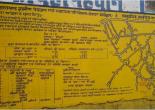- Skip to main content
- Skip to navigation
- Screen Reader Access
- Text Size
- Select Theme Default Theme Yellow Theme Pink Theme Blue Theme
- हिंदी में
URWSSP-II
Concept Paper for Follow- On- Project of
Uttarakhand Rural Water Supply & Sanitation Project
Proposed Second URWSSP: At A Glance
The GoUK vide GO No. 384/Twenty Nine (2)/12-2(36 Pey)/2012 Peyjal Anubagh- 2 dated 22nd March, 2013 conveyed its “In-principle” approval for initiation of Follow-on-Project of World Bank assisted URWSSP for IDA credit assistance. Accordingly, the Concept Paper for Follow-on-Project for URWSSP was sent to vide letter no. 13/W-182/13-14 dated 3rd April, 2013 to the Joint Secretary (Water), Ministry of Drinking Water and Sanitation, Government of India. The salient features of the proposed project are given below:
| 1 | Follow-on project preparation period | FY 2014-15 |
| 2 | Project Approval by the World Bank | December, 2015 |
| 3 | Project Implementation Period | 1st Jan, 2016 to 31st December, 2021 |
| 4 | Total Project Cost | Rs. 1650.00 Crore (US $ 275.00 Mn) |
| 5 | Sources of Financing |
World Bank : Rs. 1463.32 Crore GoUK : Rs. 175.17 Crore Community : Rs. 11.51 Crore Total Amount : Rs. 1650.00 Crore |
| 6 | Preliminary Project Description |
|
| 7 | Policy of proposed project |
1- The project envisages Program-For-Results approach as per World Bank's latest Country Assistance Strategy (CAS). The key features of Program-For-Results include:
2- It is proposed to have only one implementing agency (PMU-Swajal) registered under Society Registration Act instead of three implementing agencies as in case of on-going project. 3- The PMU-Swajal will be taking up only Single Village Schemes (SVS) based on demand responsive approach. |
| 8 | Rate of Water Supply | 55 LPCD -70 LPCD with minimum 70% household water connections. |
| 9 | Project cost estimation basis | For new Single Village Schemes, the per capita cost is R 14000.00 as on average. |
| 10 | Proposed Project benefits |
|






